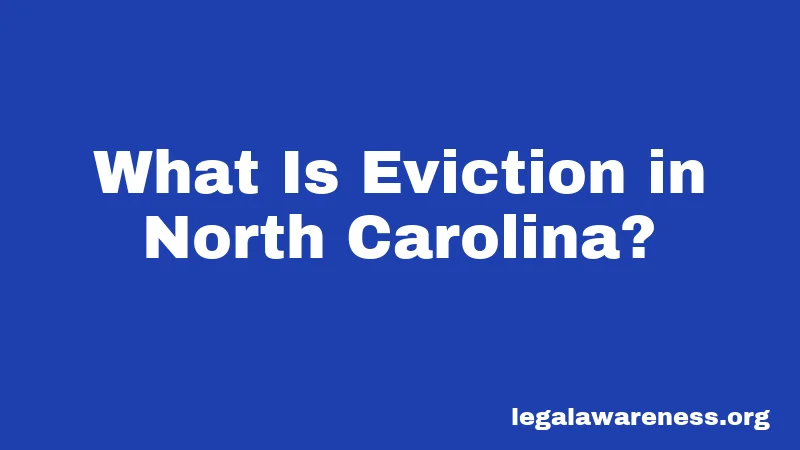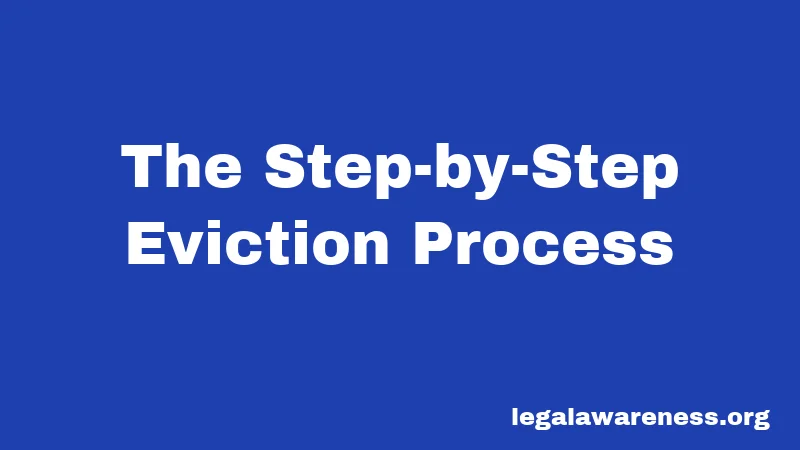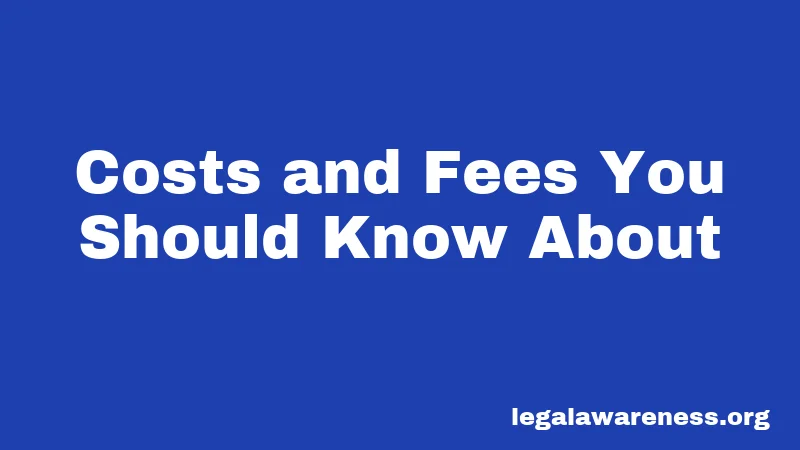North Carolina Eviction Laws in 2026: The Complete Tenant and Landlord Guide
Most people have no idea how strict North Carolina’s eviction laws can be. Seriously. Whether you’re a renter worried about losing your home or a landlord dealing with a problem tenant, understanding these rules is critical. The good news? We’re breaking it all down in plain English.
In North Carolina, eviction isn’t something a landlord can just do on their own. It’s a full court process called “summary ejectment.” That means both sides get their day in court. Let’s walk through exactly what you need to know.
What Is Eviction in North Carolina?

Okay, pause. This is important. An eviction is the legal process that removes a tenant from a rental property. It’s the only way a landlord can force someone out. The state doesn’t let landlords change locks, shut off utilities, or remove doors to push tenants out. That’s illegal, straight up.
North Carolina calls this process “summary ejectment.” It happens in court, usually in small claims court. Both the landlord and tenant get to present their side of the story to a magistrate. The court decides based on facts and evidence, not just the landlord’s say-so.
Think of it like a traffic ticket, but much more serious. There’s paperwork, a hearing, and legal consequences.
The Basic Reasons You Can Be Evicted
Here’s where things get real. North Carolina law limits evictions to specific reasons. Your landlord can’t just decide they don’t like you anymore. They need legal grounds.
Nonpayment of Rent
This is the most common reason tenants get evicted. If you miss rent, your landlord can start the process. Here’s the twist: North Carolina has no grace period. If rent is due on the 1st and you pay on the 2nd, you’re technically late.
But landlords must give you a chance. They have to send you a written “Notice to Pay or Quit.” This notice gives you 10 days to pay the full amount owed. If you catch up within those 10 days, the eviction stops. Done.
Weekends and holidays don’t count toward those 10 days, which is good news for tenants. You get a real 10-day window.
If the 10 days pass and you haven’t paid? Your landlord can file a court complaint. This kicks off the legal eviction process. The landlord can’t file right away though. They have to wait until day 11.
Lease Violations
Breaking lease rules can lead to eviction too. This includes things like having unauthorized pets, extra tenants, vehicles, or causing damage. Even disturbing neighbors can be a violation.
Wondering how much warning you get? It depends. North Carolina law doesn’t require landlords to give notice before filing for lease violations. However, most do anyway because it’s good practice and gives tenants a chance to fix the problem.
If your landlord gives you notice to cure (fix it), you’ll have time to comply. If you don’t, they can file for eviction. The exact timing varies based on the lease agreement itself.
Lease Holdover (Lease Expired)
Your lease ends. You stay anyway. That makes you a “holdover” tenant. Your landlord can evict you immediately after the lease expires without offering more time.
This is straightforward. When the lease is done, it’s done. Your landlord doesn’t need to give additional notice for this one. They can file the court complaint right away.
Criminal Activity on the Property
Here’s where landlords get aggressive authority. If someone living in the unit engages in criminal activity on or near the property, eviction can happen immediately. This includes drug dealing, illegal gambling, theft, or storing stolen goods.
The key word is “immediately.” Landlords don’t have to wait or give notice. They can go straight to court and file the eviction complaint. The landlord just needs evidence that criminal activity occurred.
The Step-by-Step Eviction Process

Okay, here’s how it actually works from start to finish. This is the legal timeline you need to understand.
Step 1: The Eviction Notice
Everything starts with proper written notice. The notice tells you why the landlord wants you out and gives you time to fix it or leave voluntarily.
For rent issues, it’s a “Notice to Pay or Quit.” For lease violations, it’s a “Notice to Remedy or Quit” (or cure). For criminal activity, there’s no required notice period—landlords can skip straight to filing.
The notice must include the specific reason for eviction and the deadline. For nonpayment, that’s 10 days. For other violations, the timeframe depends on what’s in your lease.
Step 2: Filing the Court Complaint
If the notice period expires and nothing changes, the landlord files a “Complaint in Summary Ejectment” with the clerk of court. This is the official legal document that starts the court case.
The filing fee is $96 in most North Carolina counties. This gets paid when the complaint is filed. If the tenant cures (fixes) the problem before judgment, the landlord can dismiss the case, and the filing fee might be refunded depending on the terms.
Step 3: Being Served the Summons
Here’s where it gets official. You can’t just hand you papers yourself. The law requires that a sheriff or process server deliver the summons and complaint to you.
The documents must be delivered within five days of filing. The sheriff has to try serving you personally first. If they can’t find you home, they can post the papers on your door. That counts as proper service even if you never actually read them.
Not sure what counts as a violation? The summons will spell it out clearly. It’ll include the date, time, and location of your court hearing.
Step 4: Your Day in Court
You have the right to appear in court and defend yourself. Don’t skip this hearing. Even if you think the eviction is coming anyway, you might have defenses.
You can bring witnesses, documents, photos, or other evidence. You can explain why you shouldn’t be evicted. Maybe you did pay rent and have proof. Maybe the landlord didn’t follow proper procedures. Maybe the lease violation claim is false.
The magistrate listens to both sides and makes a decision based on the facts. This is your chance to be heard.
Step 5: Judgment and Appeal
The magistrate decides who wins. If the landlord wins, you get a judgment against you. But hold on—you have 10 days to appeal if you disagree.
An appeal means taking it to a higher court for another hearing. This extends the timeline but gives you another shot if you believe the decision was wrong.
Step 6: The Writ of Possession
After the 10-day appeal period passes (or if your appeal is denied), the landlord gets a “Writ of Possession” from the court. This is the document that authorizes the sheriff to physically remove you.
The sheriff has to serve this writ and remove you within a specific timeframe. Usually, it’s within five days. The sheriff will show up at your home, and you have to leave. This isn’t optional.
Step 7: You Have to Move
Once the sheriff executes the writ, you’re out. The landlord has possession of the property again. You’re no longer allowed inside without permission.
If you left personal property behind, your landlord must store it securely for seven days. After that, they can dispose of it according to North Carolina law.
Timeline: How Long Does This Actually Take?
Real talk: evictions take time. The whole process can stretch from 30 to 100 days depending on circumstances.
Here’s the breakdown. The initial notice period is usually 10 days for nonpayment. After that expires, the landlord files the complaint. Service of the summons happens within five days. The court hearing can happen relatively quickly—sometimes within two to three weeks of being served.
After judgment, add another 10 days for appeals. Then the writ must be executed within about five days.
In reality, most evictions take around 45 to 100 days total. Some are faster. Some get delayed. If either party appeals or requests continuances, it stretches longer.
Costs and Fees You Should Know About

Evictions cost money. Here’s what you might face as a tenant.
Filing fees start at $96 for the initial complaint. If the landlord wins and you don’t appeal, they might charge you court appearance fees. According to North Carolina law, leases can include court appearance fees up to 10% of monthly rent.
There are also potential fees for trial costs, service of process, and other court expenses. Some leases allow for additional penalties if the case goes to trial twice.
For example, if your rent is $1,000 per month and your landlord wins, they could charge you $100 in court appearance fees as an additional debt. This gets added to any unpaid rent owed.
But here’s important stuff: these fees only apply if the landlord actually wins in court. If you win or the case gets dismissed, you don’t pay these fees.
Illegal Eviction Tactics (Don’t Let This Happen)
Pay attention here. Landlords cannot evict you illegally. If they try, that’s a serious problem.
Your landlord cannot change the locks to keep you out. They can’t turn off your electricity or water. They can’t remove doors or windows. They can’t throw your stuff on the street. These are all illegal self-help evictions.
If your landlord does any of this, that’s unlawful. You have legal remedies. You can sue the landlord for damages. You can file a complaint with local authorities. You have options.
The legal way—the only way—is through court. Always, no exceptions.
Special Circumstances and Exceptions
Month-to-Month Tenants
If you’re on a month-to-month lease, the landlord still needs legal grounds to evict you. They can’t just decide not to renew. They have to use one of the eviction reasons we covered—nonpayment, lease violation, holdover, or criminal activity.
However, after your lease ends naturally, if they simply choose not to renew, that’s different. They can do that for almost any reason (except discrimination). But if you’re mid-lease, they need cause.
Tenants with Housing Subsidies
Sound complicated? It’s actually not. If you live in public housing or have a Section 8 voucher, you have more protections than regular tenants. The eviction process is stricter, and you have more rights.
If you’re in subsidized housing and facing eviction, get legal help immediately. An eviction could affect your eligibility for future housing assistance.
Mobile Home Landlords
Mobile home landlords must give 60 days’ notice to end a tenancy for non-cause reasons. However, if you fail to pay rent or breach the lease, they can evict on the normal timeline like any other landlord.
Domestic Violence Situations
If you’re a victim of domestic violence, you may be able to break your lease early. You’ll need to provide documentation, but the law allows for early termination to escape an unsafe situation.
Tenant Defenses in Eviction Court
You have rights. Know them.
You can defend yourself against nonpayment claims by proving you paid the rent. Bring receipts, bank statements, or proof of payment. If you paid, you win.
You can challenge lease violation claims by showing the violation didn’t happen. Or you can show the landlord didn’t follow procedures correctly. Bring evidence.
If the landlord didn’t serve you properly, that’s a defense. If the notice wasn’t correct, that’s a defense. If the landlord violated your tenant rights, use that.
You can also claim retaliatory eviction. In North Carolina, landlords can’t evict you for complaining about code violations or asserting your legal rights. If you complained and then got evicted, that might be retaliation.
The magistrate won’t automatically believe your landlord. You have a voice. Use it.
What Happens After Eviction Judgment
Here’s what you need to know about life after losing an eviction case.
The judgment becomes public record. This will show up in background checks when you try to rent elsewhere. It affects your ability to qualify for new housing. Landlords will see it and may refuse to rent to you.
It doesn’t go on your criminal record, though. Eviction is civil, not criminal. But it’s still serious for future housing.
You can still move out voluntarily and negotiate with your landlord. Sometimes landlords will withdraw the case if you leave quickly and agree to pay back rent. It’s worth asking.
If you get evicted and have property left behind, you get seven days to claim it. After that, it’s the landlord’s to do with as they please.
How to Stay Protected as a Tenant
Here’s practical advice. Document everything. Keep copies of all rent payments, written communication, and lease agreements.
Pay rent on time. Late rent is the number one reason for eviction. Set a reminder or auto-pay if you can.
Report maintenance issues in writing. Don’t just call. Send an email or written notice so you have proof you reported it. This protects you if the landlord claims you caused damage.
Follow your lease terms. Understand what’s expected of you and stick to it. If you’re unsure about a rule, ask for clarification.
Keep your home safe. Don’t engage in criminal activity. Don’t let guests bring illegal items into the unit. The landlord can hold you responsible for what happens on the property.
If you get an eviction notice, take it seriously. Talk to a lawyer if possible. Even if you think the eviction is justified, a lawyer can spot procedural problems that might help you.
How to Handle Eviction as a Landlord
If you’re the landlord, follow every step carefully. One mistake can get your case dismissed.
Document everything from day one. Keep records of rent payments, maintenance requests, lease violations, and communication. This evidence protects you in court.
Send proper written notice. Don’t skip this step. Make sure the notice states the reason clearly and gives the correct timeframe. Different violations need different notices.
Have the notice served correctly. Don’t hand-deliver it yourself. Use certified mail, the sheriff, or a process server. Get proof of service.
File the complaint promptly after the notice period expires. Include all supporting documents. The more evidence you have, the stronger your case.
Attend the court hearing and bring your evidence. Don’t assume you’ll win automatically. Present your case clearly and professionally.
Follow through with the writ of possession. Once you win, get the writ and have the sheriff execute it. Don’t try to remove the tenant yourself.
Frequently Asked Questions
Can my landlord evict me without going to court?
No, absolutely not. North Carolina law requires eviction to go through the court system. Any attempt to remove you without court (changing locks, shutting off utilities, removing doors) is illegal self-help eviction. You can sue the landlord for damages if this happens.
How long do I have to move once I get evicted?
Once the sheriff executes the writ of possession, you’re out. You should have received notice of the eviction date, so you know when it’s happening. The writ allows the sheriff to physically remove you if you refuse to leave, so compliance is important.
Can I get my security deposit back after eviction?
It depends on the lease terms and what caused the eviction. If you damaged the property, the landlord can deduct repairs from your deposit. If the eviction was for nonpayment, your landlord might keep the deposit as rent owed. You’ll need to follow up with your landlord or small claims court to resolve this.
What if my landlord doesn’t follow proper procedures?
If your landlord fails to serve you correctly, doesn’t give proper notice, or skips required steps, the case can be dismissed. This is a valid defense in court. Tell the magistrate about the procedural problems. Bring proof that procedures weren’t followed.
Can I appeal an eviction judgment?
Yes, you have 10 days to file an appeal after judgment. This takes the case to a higher court. You’ll get another hearing to present your case. Appeals cost money and take time, but they give you another chance if you believe the decision was unfair.
What if I can’t afford a lawyer?
Legal aid organizations in North Carolina can help low-income tenants with eviction cases. Contact your local legal aid office or the North Carolina Courts website for resources. Some cases can be handled without a lawyer if you’re organized and prepared.
Does eviction show up on my criminal record?
No. Eviction is a civil matter, not criminal. It won’t appear on your criminal record. However, it is public record and will show up in background checks. This affects your ability to rent in the future.
Can my landlord evict me for complaining about repairs?
No, that’s retaliation. North Carolina law prohibits landlords from evicting tenants in response to complaints about code violations or assertions of legal rights. If you complained and then got evicted, this could be retaliation. Bring this up in court.
Final Thoughts
North Carolina’s eviction laws protect both landlords and tenants—but only if everyone follows the rules. Landlords have to use the court system. Tenants have rights to defend themselves and challenge invalid evictions.
If you’re facing eviction, don’t panic. Understand your options, gather evidence, and don’t skip your court hearing. If you need legal help, seek it. If you’re a landlord, document everything and follow procedures to the letter.
Now you know the basics. Stay informed, stay safe, and when in doubt, look it up or ask a lawyer.
References
North Carolina Judicial Branch – Landlord/Tenant Issues
North Carolina General Statutes Chapter 42 – Landlord and Tenant
City of Raleigh – Tenants Rights Handbook: Evictions and Foreclosures
iPropertyManagement – North Carolina Eviction Process 2025
